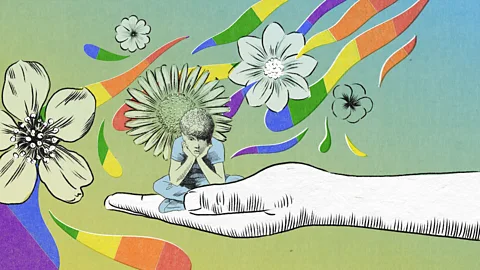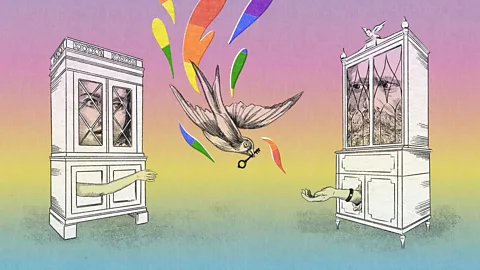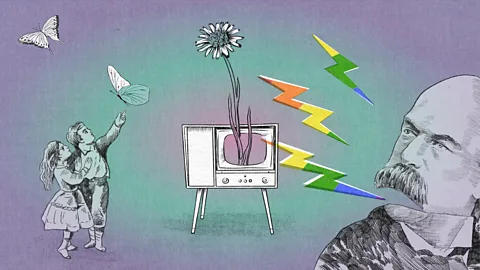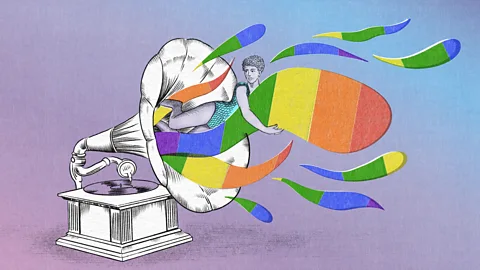Why 'coming out' can take a lifetime
 Emmanuel Lafont
Emmanuel LafontPrejudice, discrimination and ignorance cause measurable harm to LGBT+ people's health and wellbeing, but family support can make a big difference.
I had my first brush with overt homophobia when I was 10 years old. My family were staying with some elderly relatives for a few days, and as my brother and I sat watching a sitcom on TV, I heard the adults' conversation turning to the topic of a former lodger. He'd been kicked out, my great uncle declared, for having had men in his room.
"We never knew he was a homosexual," my great uncle continued. He'd worked as a radiographer at the local hospital, and he pronounced the word with a medical precision that barely concealed his distaste at having ever allowed the man under his roof.
I didn't dare turn around to look at my parents' facial expressions, in case they would realise that I too was "a homosexual". I'd recently developed a crush on the actor Elijah Wood, and this was all the evidence I needed to know that my infatuations with male stars should remain a forbidden subject.
I wouldn't broach the topic of my sexuality with my family until I was 19, at university, and in a long-term relationship with my boyfriend. As I braced myself for that conversation, I told myself that this uncomfortable moment would last just a few minutes, and that I would never have to face it again.
I couldn't have been more wrong: I would have to come out again and again, whenever I started a new job, met a stranger who asked if I had a wife, or go for a hospital appointment that asks for my next of kin. I prefer to be open but at the back of my mind, there is always a slight unease about the possibility of hostility or aggression – and sometimes those fears are justified.
Attitudes in many societies may be changing, but plenty of prejudice against the LGBT+ community still abounds across the world. In the US, LGBT+ people are nine times more likely than non-LGBT+ people to be victims of violent hate crimes, according to a report by the Williams Institute, a policy research institute at the University of California, Los Angeles. In the UK, around 20% of LGBT+ individuals have experienced a hate crime in the last 12 months, according to a survey conducted for the LGBTQ+ rights charity Stonewall. It's little wonder that more than two-thirds of LGBT+ individuals avoid holding hands with a same-sex partner in public for fear of hostile reactions.
Families cannot protect their LGBT+ relatives from all the challenges they will face – but the quality of support from our relatives can make a big difference. In fact, family support is a serious predictor of the wellbeing of LGBT+ people across the lifespan. However, declaring tolerance, and providing meaningful support, can be two very different things.
"Parents may be really well-meaning, but they might not fully get what it means for their children to be who they really are," says Rin Reczek, a sociologist at Ohio State University.
 Emmanuel Lafont
Emmanuel LafontThe burden of secrecy
When I first came out, one relative asked why I needed to be open about my sexuality. Couldn't I just leave it unsaid, they suggested, and therefore avoid the possibility of prejudice and bullying? "You don't need to tell people everything about you." I didn't see how that would be possible without telling a lot of lies, I said. Was that really the life they wanted for me?
Psychological research suggests that concealing important elements of our identity is experienced as a serious burden. This feeling is often embodied, so that it comes with a visceral sensation of physical impediment.
A study by Michael Slepian at Tufts University and colleagues found that people hiding important secrets – including their sexual orientation – tend to overestimate things like the steepness of a hill or the distance to another object in a room, and they were less willing to help with physical tasks like moving books. "Secrets weigh people down," the researchers concluded. (Read BBC Future's article on how certain secrets can affect families over many generations.)
Concealing a core part of your identity can also damage your social life. Relationships thrive on the disclosure of our innermost thoughts and feelings, and large secrets are going to be a major barrier to that.
Even if someone is generally "out", there may be specific situations in which they might choose to remain in the closet through fear of unwanted hostility or aggression. In a conversation with a taxi driver, for example, someone might avoid mentioning their same-sex partner in case it triggers a negative reaction.
Reczek emphasises that we should certainly feel no compulsion to come out when we do not feel comfortable doing so. "It's quite rational to maybe not share everything with people who might be homophobic or transphobic." As much as we would like to live openly all the time, we have to weigh up the costs, which can exceed the benefits.
Yet momentarily slipping back into the closet creates another form of mental strain. Clayton Critcher, a professor of marketing, cognitive science and psychology at the University of California, Berkeley, and Melissa Ferguson, now a professor of psychology at Yale University, conducted an experiment that lightly mimics the experience of an LGBT+ person concealing their identity. They asked straight participants to have 10-minute conversations about dating and family life, without revealing any clues about their sexual orientation. If they spoke about their dating preferences, for example, they had to describe their partner in gender neutral terms.
To be clear: this was a very mild simulation of the LGBT+ experience, since there was no real risk of hostility if they slipped up, and a one-off 10-minute interaction is minimal compared to the enduring concealment that real life might involve. But the straight participants nevertheless found the mental vigilance and cognitive gymnastics to be significantly fatiguing, reducing their scores on subsequent IQ-style tests of non-verbal reasoning.
 Emmanuel Lafont
Emmanuel LafontMinority stress
The challenges of navigating these interactions and the constant awareness of implicit or explicit prejudice together contribute to a mental burden known as "minority stress". This type of stress, caused by the pressure of discrimination, can have long-term repercussions for mental wellbeing, including a heightened risk of depression and suicide compared to straight individuals. You might hope that minority stress would be lessening as attitudes in society change, but a study from 2022 found no evidence that this health gap has been declining in countries such as the UK, the US, Canada, or New Zealand. (Indeed, a separate study by Rin Reczek and Hui Liu at Michigan State University suggests that the health gap may be increasing in younger generations.)
At their best, our relatives can act as a buffer to our anxieties, making it easier to cope with the challenges we face. Unfortunately, family interactions can also generate more stress. The worst situation may be outright hostility and queerphobia, but there are other ways that relatives can add to the burden. Reczek and their colleague Emma Bosley-Smith at Alma College in Michigan explore these in their book Families We Keep, a sociological investigation into the bonds between LGBT+ adults and their parents.
During Bosley-Smith and Reczek's in-depth interviews with more than 75 LGBT+ adults, one point that came up repeatedly was family members failing to take the "coming out" conversation seriously. Some would describe the person's identity as a phase or tell them that they were simply confused. Others would try to push the topic under the rug and avoid further discussion.
"For some of the LGBTQ adults we spoke with, the parents would not show any curiosity or interest," says Bosley-Smith. In such cases, the children would sometimes need to revisit the topic to check the parents had truly heard and understood what they had said. "You have to come out multiple times to the same people," says Bosley-Smith.
Even small signs of curiosity from the parents were greatly appreciated, but often the parents would make little effort to understand the issues the LGBT+ members were facing. "A lot of adult children have to do this educational work, and it can be quite challenging," says Reczek.
Shubhangi Karmakar, a queer and polyamorous doctor in psychiatry and writer in Dublin, Ireland, reports feeling “wistful” at not having been able to have shared more of their self-discovery with their family at a younger age. "Especially in those formative years, when you are building any kind of identity, you need support,” they say. They hope that others would be "be able to have the happiness and the heartbreak and all the rest of it as a journey, together", though they have personally noticed some improvements in their family conversations recently.
Bosley-Smith and Reczek found that even some of the more "accepting" parents were surprised to hear that they had appeared too uninvolved and disinterested. Many LGBT+ individuals would have liked a little more encouragement to open up about their experiences.
 Emmanuel Lafont
Emmanuel LafontHappier families
Each family will have unique dynamics, so there are no hard and fast rules for the best ways to support LGBT+ members, but based on their research, Bosley-Smith and Reczek do have some suggestions.
For parents and guardians, the first step is to create an environment in which gender and sexuality can be discussed freely without prejudice, before the family member even chooses to come out. What may seem like a harmless joke could have lasting consequences for someone who has not yet spoken about their sexuality or gender.
If you suspect that a family member is queer, it might be tempting to open a conversation about that fact. Sometimes this is welcome and necessary – as Chris Dunne, who works in advertising in London UK, tells me. After years of feeling unhappy in the closet and pretending to be someone that he was not, he had reached a kind of "emotional breaking point". Seeing his son's distress, Dunne's father decided to broach the subject himself. "We know that you're gay and you need to start to deal with it," Dunne recalls his father saying. "Because this is not healthy, the pain that you're putting yourself through." Dunne describes it as a green light that would eventually allow him to live more openly.
Reczek advises that parents and other family members tread carefully. While complete disinterest is hurtful, some LGBT+ family members felt that their well-meaning relatives were pushing a little too hard to get them to talk about their identity, which "felt like a little bit of an infringement on their personal freedoms". It may be better to create a safe space for these conversations to occur whenever the LGBT+ individual feels comfortable.
When the family member is ready to talk, Bosley-Smith suggests asking the person how much they would like to discuss, and explicitly saying that you'd like to have further chats whenever they feel like discussing the subject again. This allows them to take the coming out process at their own pace.
Rather than expecting the LGBT+ member to do all the educating, family members can also make a conscious effort to understand the LGBT+ individual's experience from other sources. Relatives could turn to other people in their life who might have better knowledge, or online resources and research, or even trained professionals from charities providing services to LGBT+ individuals and their families. "Doing the homework themselves, in whatever capacity, is probably the most helpful thing that parents can do," says Reczek.
It's rarely too late to show growth. When one person I interviewed, who preferred not to give his name, first came out as gay to his mother, her reaction was somewhat frosty. "She was just silent for a while, and then the first thing she said was, 'well, I suppose I won't get any grandkids'," he told me. Over time, she became more accepting, but the topic remained difficult to discuss. Recently, however, he has entered a long-term relationship, which prompted her to apologise for the way that she'd first reacted. The apology meant more than he'd have previously imagined, he says. "Subconsciously, I needed her to say that. And the fact that she proactively said it, without me raising the topic or asking, made me feel a lot of relief."
Personally speaking, I find it hard to blame my parents for not having spoken up to my grand uncle. It was the late 1990s, when awareness of LGBT+ issues was much lower than it is today, and when I finally came out they were very accepting of my partner. But I hope, if I were growing up today, I might have felt more support to be myself over those formative years – it would have lifted some weight from my young shoulders.
* David Robson is a science writer and author of The Expectation Effect: How Your Mindset Can Transform Your Life, published by Canongate (UK) and Henry Holt (USA). He is @d_a_robson on Twitter.
--
